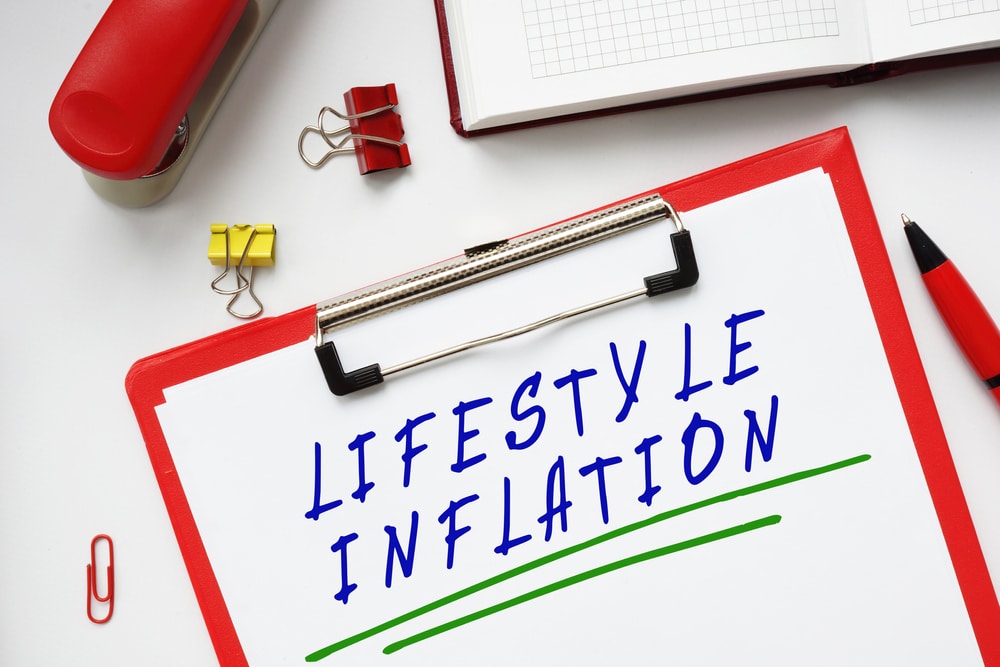Studies have found that most people tend to spend more money when they start earning more. For example, a graduate who just secured their first job may rent a comfortable one-bedroom apartment for $1,000 a month but will likely move to a more expensive apartment when their salary increases.
Does that mean that the old apartment is no longer adequate? No! The graduate decides to find another apartment not because they need it but because they can afford it.
When an individual’s monthly income rises, their expenses usually follow suit. Such a scenario is called lifestyle inflation. While you can comfortably pay for your monthly expenses, lifestyle inflation makes it challenging to turn your high income into a way to create wealth.
📈🤖 Unlock unparalleled trading potential with GPT Stocks Master AI! Revolutionize your portfolio, leveraging real-time insights and predictive analytics. Don’t miss out – step into a world where precision and profitability meet. Ready to transform your trading journey? Click “Master My Trades” now for your exclusive access! ✨🚀📊
Why Does Lifestyle Inflation Happen?
Many people mostly spend more money when they earn more as a result of comparison. They want to match their friends’ or colleagues’ spending habits. For instance, if your colleague comes to work with a Mercedes Benz, you may get the urge to buy a similar car model, even if your current Toyota operates just fine.
However, what you may know is that your colleague could be paying off a high-interest loan they obtained to buy their Mercedes Benz. Moreover, they might be struggling to maintain the car.
Another reason lifestyle inflation happens is because of the sense of entitlement. When you work hard to earn more money, there is a chance you will feel justified to treat yourself by acquiring the best things in life. This is totally understandable. However, spending a lot of money to reward yourself can prove to be harmful to your financial health in the near future.
When Does Spending More Money Make Sense?
Your lifestyle changes over time, meaning you are likely to spend more money on some things you avoided previously. For instance, when you get married and have children, you may want to sell your small car for an SUV or move to a bigger apartment.
Also, if you get a new promotion at work, which requires longer working hours, the need to hire a housekeeper may arise.
How to Avoid Lifestyle Inflation
While lifestyle inflation could happen in your life at some point, it is important to keep in mind that all spending decisions you make now affect your financial situation in the future.
If you increase your spending unnecessarily, you will likely continue living paycheck to paycheck even when you receive a massive pay rise. That said, here is how to avoid lifestyle inflation:
Save more
Financial advisors usually advise people to save more than they spend to live a comfortable life after retirement. For example, instead of buying a pair of shoes worth $1,000, you can deposit the money in a retirement account offering a 5% ROR (rate of return), which could be worth over $7,000 in 30 years.
Define Your Needs and Wants
It is essential to know your needs and wants. Prioritize spending money on things you need for your survival. As for the wants, such as subscriptions to video/music streaming platforms, you can decide to cut them off and channel the money to a savings account.
How to Stop Lifestyle Creep
Do the Math: After getting a salary increase, calculate your income after all the deductions. You may discover that the raise is not as significant as you thought. This can help you avoid spending more.
Do not Make Long-Term Commitments: It is advisable to avoid jumping into long-term commitments, such as taking a loan to buy a new car or house immediately after your paycheck rises.
Settle Debts: Instead of spending more on unnecessary things after a salary raise, you can use the extra money to pay off debts.
Invest: If you use the extra funds to invest, you will be thankful in your retirement years as you’ll be able to maintain your lifestyle.
Conclusion
If you keep increasing your expenses every time your salary rises, it is possible to continue living in debt while earning $250,000 annually. It will be wise if you channel the extra money into investments and savings.

